

Teaching Students to Avoid Plagiarism. How Social Media Encourages Plagiarism (and Six Ways You Can Fight It) Has the ubiquity of social media given plagiarism new life?
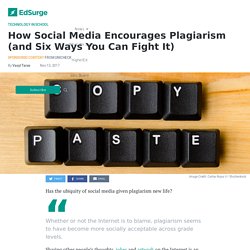
Sharing other people’s thoughts, jokes and artwork on the Internet is an everyday act. We repost so much so frequently that some platforms, such as Facebook, have been compelled to develop their own citation rules to combat plagiarism. Even so, students spend much of their time in an environment where authorship is not held in high regard. Home : Academic honesty and plagiarism. Stop Plagiarism: Tools to Stop Student Plagiarism. Lecture, essay, cheat, repeat… plagiarism, why it's endemic and 10 ways to avoid. I sat through a one hour talk (lecture) on plagiarism this week, where the speaker (University plagiarism bod), showed not a single citation but plenty of anecdotal bullet points.
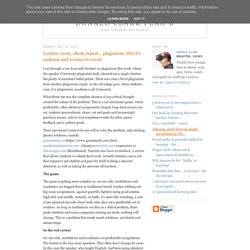
There was even a bit of plagiarism from another plagiarism expert. As the old adage goes, when students copy, it is plagiarism; academics call it research. What threw me was the complete absence of any critical thought around the nature of the problem. This is a cat and mouse game, where predictable, often identical assignments (largely long-form essays) are set, students procrastinate, share, cut and paste and increasingly purchase essays, only to wait sometimes weeks for often sparse feedback and a solitary grade. There just doesn’t seem to be any will to solve the problem, only sticking plaster solutions, namely grammarly.
The game In the red corner On one side, institutions and academics set predictable assignments. In the blue corner Institutionalised behaviour The problem Undetectable cheating What to do? 1. 2. Talking plagiarism with students. Today I spent some time with students discussing the issue of plagiarism.
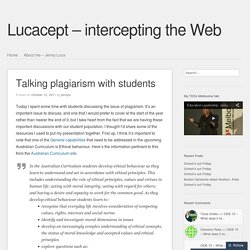
It’s an important issue to discuss, and one that I would prefer to cover at the start of the year rather than nearer the end of it, but I take heart from the fact that we are having these important discussions with our student population. I thought I’d share some of the resources I used to put my presentation together. First up, I think it’s important to note that one of the General capabilities that need to be addressed in the upcoming Australian Curriculum is Ethical behaviour.
Here’s the information pertinent to this from the Australian Curriculum site. In the Australian Curriculum students develop ethical behaviour as they learn to understand and act in accordance with ethical principles. Understanding the need to behave with academic honesty certainly is an ethical understanding our students need to have. I really liked the quote they use on their page, and made a point of discussing it in detail.
Like this: Lines on Plagiarism Blur for Students in the Digital Age. “Now we have a whole generation of students who’ve grown up with information that just seems to be hanging out there in cyberspace and doesn’t seem to have an author,” said Teresa Fishman, director of the Center for Academic Integrity at Clemson University.
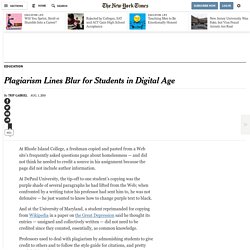
“It’s possible to believe this information is just out there for anyone to take.” Professors who have studied plagiarism do not try to excuse it — many are champions of academic honesty on their campuses — but rather try to understand why it is so widespread. In surveys from 2006 to 2010 by Donald L. McCabe, a co-founder of the Center for Academic Integrity and a business professor at Rutgers University, about 40 percent of 14,000 undergraduates admitted to copying a few sentences in written assignments.
Perhaps more significant, the number who believed that copying from the Web constitutes “serious cheating” is declining — to 29 percent on average in recent surveys from 34 percent earlier in the decade. Ms. Photo Ms. Plagiarism - What's The Difference? Jakar Dzong, Bhutan.
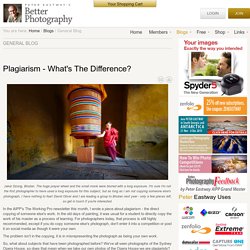
The huge prayer wheel and the small monk were blurred with a long exposure. I'm sure I'm not the first photographer to have used a long exposure for this subject, but as long as I am not copying someone else's photograph, I have nothing to fear! David Oliver and I are leading a group to Bhutan next year - only a few places left, so get in touch if you're interested. Cite Sources — Plagiarism.org - Best Practices for Ensuring Originality in Written Work. This depends on what type of work you are writing, how you are using the borrowed material, and the expectations of your instructor.
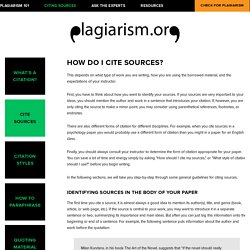
First, you have to think about how you want to identify your sources. If your sources are very important to your ideas, you should mention the author and work in a sentence that introduces your citation. Home : Academic honesty and plagiarism. Why do students cheat? Listen to this dean's words. Editor’s note: Since the publication of this article, the University of Florida terminated Chris Loschiavo’s employment when it learned he used his UF work computer account to purchase pornography.
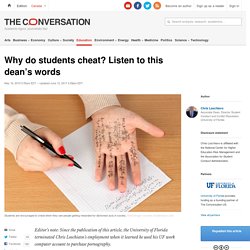
Cheating in college has been with us since the inception of higher education. In recent months, cases of cheating, including large-scale cheating at elite colleges, have led to considerable turmoil. Many of these behaviors could well start to take shape right at the level of high school. A survey conducted by renowned academic integrity researcher Don McCabe shows how widespread the problem is in high schools.
Large-scale cheating. Talking plagiarism with students. Today I spent some time with students discussing the issue of plagiarism.
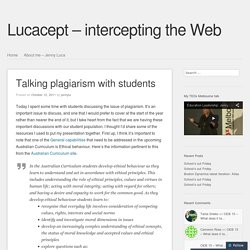
It’s an important issue to discuss, and one that I would prefer to cover at the start of the year rather than nearer the end of it, but I take heart from the fact that we are having these important discussions with our student population. I thought I’d share some of the resources I used to put my presentation together. First up, I think it’s important to note that one of the General capabilities that need to be addressed in the upcoming Australian Curriculum is Ethical behaviour. Here’s the information pertinent to this from the Australian Curriculum site. In the Australian Curriculum students develop ethical behaviour as they learn to understand and act in accordance with ethical principles. Understanding the need to behave with academic honesty certainly is an ethical understanding our students need to have. I really liked the quote they use on their page, and made a point of discussing it in detail. Like this: Lines on Plagiarism Blur for Students in the Digital Age.
Digicentral - Plagiarism. The punishable perils of plagiarism - Melissa Huseman D’Annunzio. The following are excellent resources for teachers and students regarding plagiarism and the proper citation of sources: The OWL at Purdue (Online Writing Lab) Here you'll find numerous articles on topics such as Contextualizing Plagiarism, Authorship and Popular Plagiarism, Copyright, Collaborative Authorship, Avoiding Plagiarism, Summarizing, Paraphrasing, Quoting, and using MLA and APA citations.
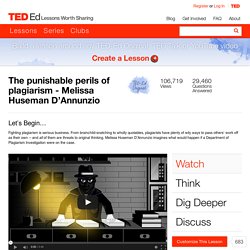
Also, you can find extensive Research and Citation Resources on topics such as Conducting Research, Using Research, APA Style, MLA Style, and Chicago Manual of Style. The Plagiarism Spectrum: Instructor Insights into the 10 Types of Plagiarism TurnItIn, the study’s authors, polled both higher and secondary education instructors in order to produce this White Paper. The authors acknowledge that, “the lines of what constitute plagiarism are blurring as the Internet reshapes culture and education” (3), and they provide definitions and examples of the ten most common types of plagiarism. Please No Posers. Guide to Preventing Plagiarism. Students, particularly those in college, are expected to adhere to rigorous codes of conduct that stress academic integrity, including prohibitions against plagiarism.
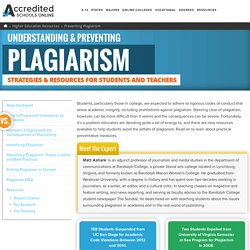
Steering clear of plagiarism, however, can be more difficult than it seems and the consequences can be severe. Fortunately, it’s a problem educators are devoting quite a bit of energy to, and there are new resources available to help students avoid the pitfalls of plagiarism. Read on to learn about practical preventative measures. What Is Plagiarism? Intentional vs. In theory, plagiarism is a fairly simple concept: it involves stealing the words and/or ideas of another without attribution or acknowledgment. Merriam-Webster Dictionary: The act of using another person’s words or ideas without giving credit to that person. Council of Writing Program Administrators: Indiana University Bloomington School of Education: Plagiarism.org - Best Practices for Ensuring Originality in Written Work.